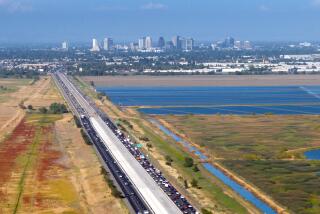Editorial: Congress needs more gas taxes and fewer gimmicks to deal with crumbling roads and bridges
After a decade of patches and extensions, Congress is finally poised to approve a transportation bill that would provide a full five years of much-needed federal funding to maintain the nation’s roads and bridges, invest in public transit and speed the movement of freight. The good news is that the measure will let states and local agencies, such as the Los Angeles Metropolitan Transportation Authority, plan on consistent funding and federal support through September 2020.
Granted, by increasing the total budget only modestly to $300 billion, it would essentially maintain the status quo rather than address the huge backlog of maintenance needs. But a modest increase still ranks as a win, considering that small-government conservatives pushed to cut federal aid and foist more financial responsibility onto states.
The bad news? Congress will cover much of the cost by tapping reserves and stealing funds from unrelated programs. Members have — again — failed to address the chronic shortfall in the federal trust fund that is supposed to pay for the nation’s transportation infrastructure.
Created in 1956, the federal Highway Trust Fund was envisioned as a user-supported system, with drivers paying fuel taxes at the pump to finance roads, highways and bridges. But Congress hasn’t raised the 18.4-cent-per-gallon federal gas tax in more than 20 years, allowing inflation to whittle away the buying power of the fund. Meanwhile, the improving fuel efficiency of cars and trucks resulted in vehicles contributing less in gas taxes per mile traveled.
For most of the fund’s history, there has been bipartisan support for raising the gas tax when needed to keep the Highway Trust Fund solvent. Yet in recent years, that bipartisanship evaporated as congressional Republicans resisted any kind of tax increase. Instead, lawmakers resorted to gimmicks and one-time monies to help pay for the ongoing need for transportation aid.
The latest bill is no different. To fill the $70-billion trust fund shortfall for the next five years, Congress would tap the Federal Reserve’s rainy-day fund, sell oil from the nation’s Strategic Petroleum Reserve and take customs fees paid by airline and cruise passengers. So much for having road users pay for the roads. In five years, when this bill sunsets, planners will find themselves in same worrisome spot, wondering whether and how Congress will supplement the increasingly inadequate Highway Trust Fund.
There is one glimmer of hope in the bill that Congress is pondering the future: It directs the Department of Transportation to offer grants for states to test and develop alternative user fees that could replace or supplement the gas tax and maintain the long-term solvency of the federal fund. One possibility is to charge drivers based on how many miles they drive rather than the gas they consume, as Oregon is experimenting with for its own transportation needs.
Lawmakers in California are confronting a quandary similar to the one Congress faces. The state has consistently underfunded transportation infrastructure projects, to the point that Caltrans now has a $59-billion backlog of highway and bridge repairs. Cities and counties face an even bigger bill, needing $78 billion to return local streets to good condition. Yet lawmakers, primarily Republicans, have balked at raising vehicle fees or the state’s gas tax, which hasn’t been increased since 1994. Instead, they’ve pushed one-time funding schemes and dead-on-arrival ideas, such as trying to fund highway repairs with cap-and-trade dollars that should be used to reduce greenhouse gas emissions.
Gov. Jerry Brown proposed a better way, offering long-term stable funding with an increase in the state’s gasoline and diesel excise taxes and a new $65-per-vehicle highway user fee that would apply to all cars and trucks, regardless of how they’re powered. This is how Californians — and Americans in general — have traditionally paid for roads, highways and bridges. When state lawmakers get to work in January, they should reject the gimmicks and short-term thinking that bogged down Congress and adopt a responsible, long-term plan to reinvest in California’s transportation infrastructure.
Follow the Opinion section on Twitter @latimesopinion and Facebook.
More to Read
A cure for the common opinion
Get thought-provoking perspectives with our weekly newsletter.
You may occasionally receive promotional content from the Los Angeles Times.










